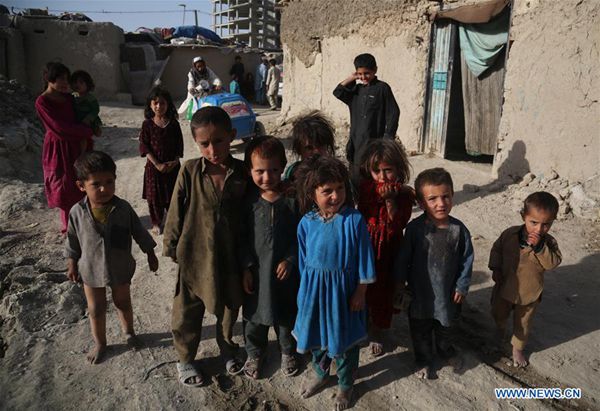World Refugee Day an important reminder of our duty to care for others
- By Eugene Clark
 0 Comment(s)
0 Comment(s) Print
Print E-mail China.org.cn, June 23, 2017
E-mail China.org.cn, June 23, 2017
 |
|
Afghan displaced children are seen in Kabul, Afghanistan, June 20, 2017, the World Refugee Day. [Photo/Xinhua] |
One of the qualities I most admired in my parents and grandparents is their friendliness toward strangers. On more occasions than I can count, friends of friends would arrive at our door-step and end up staying the night. Because we lived in the regional town centre and had many friends who lived on farms, it was not common to find every available floor space in the basement where the 4 boys of our family slept taken up on a Friday or Sat night by teenagers who came in late the night before. My parents' and grandparents' generosity was all the more remarkable given they had large families of their own and very limited income.
On a much wider and significant scale, this same 'good Samaritan' attitude of welcoming strangers into our midst is the spirit and practice we need to see more of when it comes to the millions of refugees presently fleeing war, terrorism and other deplorable conditions. This is why, 16 years ago, on Dec. 4, 2000, the United Nations General Assembly in Resolution 55/76 decided that, from June 20, 2001, would be deemed and celebrated as World Refugee Day. In taking this action, the General Assembly stressed that 2001 marked the 50th anniversary of the 1951 Convention relating to the Status of Refugees.
World Refugee Day, commemorates the strength, courage and perseverance of millions of refugees who have risked their lives to escape terror, torture and likely death in order to find and contribute to a better world for their children. Sadly, many of them die in the attempt or are preyed upon by those who would, for grubby financial gain, take advantage of their plight. I am sure that many readers share my experiences of having known, worked with, been neighbors to, or taught refugee parents and children, come to know their amazing stories and been humbled by their dedication, hard work and resilience. For example, one Vietnamese family I worked with arrived by boat with nothing. Today they and their children and grandchildren are professionals (doctors, dentists, accountants, lawyers), entrepreneurs running their own successful businesses, active in their church and freely giving to charitable organizations and other community activities.
The UN, noted in Global Trends, a report released this week that almost 66 million people were forcibly displaced from their homes last year. Many of these refugees were children. Indeed, last year was the worst year ever and thus the need is greater than ever.
On the one hand, the countries of the world need to work towards world peace and eliminating the conditions that force refugees to flee in the first place. At the same time, it must be acknowledged that there will always be some refugees and we need to show them the care and give them the support they need. I saw a moving example of this in Sydney where Vietnamese refugees from the 1970s provided money, clothes, food and other support to recent Syrian refugees arriving in Australia. The Vietnamese/Australian citizens indicated they wanted to extend to Australia's newest arrivals the same humanitarian spirit and relief they benefitted from in Australia.
Unfortunately, the burden of looking after refugees falls far more heavily on particular countries, especially neighboring countries such as Jordan, Turkey and Lebanon. These countries in turn need the help and support of the UN and other countries.
Governments and the media must also deal with a lot of the misinformation and fear surrounding refugees. As a whole, refugees are more often than not a net gain to the economy of the country to which they finally settle. As a whole, most lead peaceful and productive lives. They pay taxes. They add to the diversity and richness of their adopted countries. Their children become loyal and patriotic citizens.
Humanitarian relief for refugees must be accompanied by well thought out policies, workable and equitable solutions and efficient operations. Treating refugees humanely and charitably is morally the right thing to do. It is the best defence against the hatred of radical Islamic terrorists. Such values are what will ultimately prevail over the ideology of hate and intolerance.
Eugene Clark is a columnist with China.org.cn. For more information please visit:
http://m.91dzs.com/opinion/eugeneclark.htm
Opinion articles reflect the views of their authors only, not necessarily those of China.org.cn.





